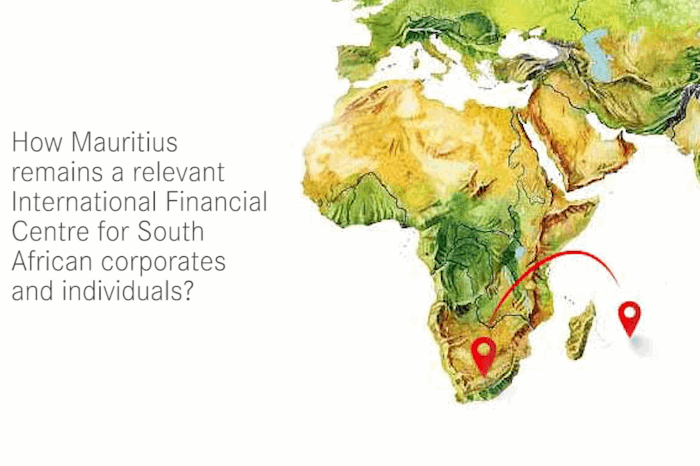The cultural and economic ties and the numerous bilateral agreements between Mauritius and India, no doubt, make Mauritius the best partners. With the positioning of Mauritius as a hub, bridging Asia and Africa, the Island offers very promising opportunities of triangular cooperation between India, Mauritius and the African continent. “If we take India’s export of goods and services, for instance, these average USD528bn p.a. Most of India’s exports go the US, UAE and Europe and a relatively smaller amount to the African countries. With the enabling of the Comprehensive Economic Cooperation and Partnership Agreement (CECPA) on 1 April 2021, which, by the way, has actually been guided by the role that Mauritius can play as a platform for India to penetrate the African continent, we can see more activities between India and Africa via Mauritius,” says Yogesh Gokool, Senior Executive, Head Global Business at AfrAsia Bank. In addition, Mauritius is a multilingual country and it can act as a facilitator for Indian companies with respect to the 31 Francophone countries of Africa.
Furthermore, Mauritius is a member of both the COMESA and SADC and this allows duty free transportation of goods from the Island to Eastern and Southern Africa. Since the transportation of goods from Mauritius to the coastal African cities can at times be easier than internal transportation between them, businesses domiciled in Mauritius can gain access to special economic zones in Africa and enjoy an easier business travel regime. Indian companies can therefore have an industrial base in Mauritius to cater for the demand of the African continent.
Yogesh Gokool also observes that international trade has experienced a sharp drop due to the spread of the COVID-19, affecting almost every sector of the global economy. Experts predict that if the virus is not contained soon, production could fall up to 40%, which could translate to soaring unemployment and anaemic economic activity for years to come. “Whilst it is true that this pattern is widespread, the recovery speed substantially varies across countries. For instance, in July 2021, India’s monthly exports (goods only) hit a record of USD35.2bn, signalling a rapid economic recovery in key Western markets which has led to a rise in demand for Indian products. The Indian Government has set a merchandise exports target of USD500bn for FY23 and a USD1 trillion in the next 5 years.” Strict lockdowns and international travel bans during the pandemic have affected and keep affecting tourism revenues in the balance of payments, especially for countries which typically attract many tourists, such as Mauritius.
“Going forward, we expect to see more companies take their businesses to international markets. Shrinking economies will force companies to look for new growth opportunities beyond borders. Even before COVID-19, companies were banking on international expansion, especially in emerging markets like Africa and Asia, for their long-term prospects. Coronavirus will only force them to expedite their pre-existing expansion plans. There are also other reasons why businesses will have to consider taking their businesses internationally, one of them being, proximity to sources of raw materials and semi-finished goods. More companies have been forced to stop operations due to disrupted supply chains merely because they are unable to access critical raw materials. Strengthening of domestic sourcing by opening plants in resource-rich countries could be a key objective to make companies more resilient and sustainable in this pandemic era.”
Another prediction for global trade is the export restrictions ban on essential goods. Although exports restrictions increase goods availability in domestic markets and lower prices, COVID-19 has proven that this approach is not sustainable. Domestic companies tend to slow down their production when forced to serve local markets, their demand for supplies from world markets shrinks and international prices for both raw materials and finished products take the plunge. This is damaging to economies that rely on international markets for essential goods like food and medical supplies.
Stories
-
 Expert views
October 22, 2025
Mauritius–UAE: A Strategic Bridge to Africa
Expert views
October 22, 2025
Mauritius–UAE: A Strategic Bridge to Africa
-
 Expert views
August 14, 2024
Mauritius as a gateway for investment and transfer of capacity to Africa.
Expert views
August 14, 2024
Mauritius as a gateway for investment and transfer of capacity to Africa.
-
 Expert views
July 26, 2024
We have seen a marked increase in initiatives aimed at supporting women’s entry and advancement in the finance industry.
Expert views
July 26, 2024
We have seen a marked increase in initiatives aimed at supporting women’s entry and advancement in the finance industry.
-
 Expert views
June 11, 2024
With Africa’s projected continued growth, a robust banking network is crucial.
Expert views
June 11, 2024
With Africa’s projected continued growth, a robust banking network is crucial.
-
 Expert views
March 15, 2024
Tailored Financial Excellence: Mauritius’ Unique Investor Advantages
Expert views
March 15, 2024
Tailored Financial Excellence: Mauritius’ Unique Investor Advantages
-
 Expert views
May 11, 2023
Banking on sustainable finance to scale up the Mauritius IFC
Expert views
May 11, 2023
Banking on sustainable finance to scale up the Mauritius IFC
-
 Expert views
May 10, 2023
Mauritius & South Africa: A mutually beneficial trade relationship
Expert views
May 10, 2023
Mauritius & South Africa: A mutually beneficial trade relationship
-
 Expert views
April 17, 2023
Mauritius IFC: From a conventional jurisdiction to a forward-looking hub
Expert views
April 17, 2023
Mauritius IFC: From a conventional jurisdiction to a forward-looking hub
-
 Golf
December 18, 2022
Record win for Rozner in AfrAsia Bank Mauritius Open
Golf
December 18, 2022
Record win for Rozner in AfrAsia Bank Mauritius Open
-
 Golf
December 17, 2022
Rozner chasing AfrAsia Bank Mauritius Open glory
Golf
December 17, 2022
Rozner chasing AfrAsia Bank Mauritius Open glory
-
 Golf
December 16, 2022
Rozner in the hunt again at AfrAsia Bank Mauritius Open
Golf
December 16, 2022
Rozner in the hunt again at AfrAsia Bank Mauritius Open
-
 Golf
December 15, 2022
Course record for Välimäki to lead AfrAsia Bank Mauritius Open
Golf
December 15, 2022
Course record for Välimäki to lead AfrAsia Bank Mauritius Open
-
 Expert views
December 01, 2022
Africa’s Drive Towards Sustainability: Launch of ESG GPS in Mauritius
Expert views
December 01, 2022
Africa’s Drive Towards Sustainability: Launch of ESG GPS in Mauritius
-
 Expert views
October 20, 2022
Quelle est l'influence des taux d'intérêt sur le prix de l'or?
Expert views
October 20, 2022
Quelle est l'influence des taux d'intérêt sur le prix de l'or?
-
 Golf
October 18, 2022
Mont Choisy Le Golf set to impress as host of 2022 AfrAsia Bank Mauritius Open
Golf
October 18, 2022
Mont Choisy Le Golf set to impress as host of 2022 AfrAsia Bank Mauritius Open
-
 Golf
September 16, 2022
Burmester confirmed for 2022 AfrAsia Bank Mauritius Open
Golf
September 16, 2022
Burmester confirmed for 2022 AfrAsia Bank Mauritius Open
-
 Expert views
July 28, 2022
EUR/USD – la roupie prise en étau
Expert views
July 28, 2022
EUR/USD – la roupie prise en étau
-
 Expert views
June 01, 2022
Africa CEO Forum 2022 - Malachy McAllister on CNBC Africa
Expert views
June 01, 2022
Africa CEO Forum 2022 - Malachy McAllister on CNBC Africa
-
 Differentiate. Inspire. Celebrate
April 29, 2022
AfrAsia Bank further sharpens its expertise with Elliott Wave Certification
Differentiate. Inspire. Celebrate
April 29, 2022
AfrAsia Bank further sharpens its expertise with Elliott Wave Certification
-
 Expert views
March 04, 2022
Journée des droits des femmes: STOP aux freins invisibles
Expert views
March 04, 2022
Journée des droits des femmes: STOP aux freins invisibles
-
 Expert views
March 04, 2022
The real opportunity and uniqueness of Mauritius lies in its diversified economic landscape with opportunities in various sectors.
Expert views
March 04, 2022
The real opportunity and uniqueness of Mauritius lies in its diversified economic landscape with opportunities in various sectors.
-
 Expert views
March 02, 2022
La crise Russie-Ukraine : Quels sont les enjeux financiers à prévoir ?
Expert views
March 02, 2022
La crise Russie-Ukraine : Quels sont les enjeux financiers à prévoir ?
-
 Testimonials
February 08, 2022
'AfrAsia Bank has always been a trusted financial partner for us.'
Testimonials
February 08, 2022
'AfrAsia Bank has always been a trusted financial partner for us.'
-
 Testimonials
February 08, 2022
“ Their legacy-building ethos and customer service structure resonates with us.”
Testimonials
February 08, 2022
“ Their legacy-building ethos and customer service structure resonates with us.”
-
 Expert views
January 19, 2022
Preserving the human touch in banking in the digital age
Expert views
January 19, 2022
Preserving the human touch in banking in the digital age
-
 Expert views
November 22, 2021
Mauritius is back in business – What to expect for the Tourism/Hospitality and Real Estate sectors?
Expert views
November 22, 2021
Mauritius is back in business – What to expect for the Tourism/Hospitality and Real Estate sectors?
-
 Expert views
November 22, 2021
A new era for the Mauritius IFC
Expert views
November 22, 2021
A new era for the Mauritius IFC
-
 Expert views
November 22, 2021
A Purposeful Brand - It's not about 'I', it's about 'We'
Expert views
November 22, 2021
A Purposeful Brand - It's not about 'I', it's about 'We'
-
 Expert views
November 03, 2021
Quels sont les enjeux pour la Bourse de Maurice avec l’arrivée du Cape Town Stock Exchange ?
Expert views
November 03, 2021
Quels sont les enjeux pour la Bourse de Maurice avec l’arrivée du Cape Town Stock Exchange ?
-
 Expert views
October 20, 2021
#Stagflation : Comment s’adapter à cet nouvel ordre économique ?
Expert views
October 20, 2021
#Stagflation : Comment s’adapter à cet nouvel ordre économique ?
-
 Expert views
October 20, 2021
Fonds d’investissements : Est-ce le moment d’investir ?
Expert views
October 20, 2021
Fonds d’investissements : Est-ce le moment d’investir ?
-
 Expert views
October 18, 2021
Marché des changes: Quel est l’impact sur nos réserves en devises étrangères ?
Expert views
October 18, 2021
Marché des changes: Quel est l’impact sur nos réserves en devises étrangères ?
-
 Expert views
September 15, 2021
« Le marché de la banque privée est amené a plus que doubler au cours des cinq prochaines années »
Expert views
September 15, 2021
« Le marché de la banque privée est amené a plus que doubler au cours des cinq prochaines années »
-
 Expert views
September 01, 2021
Rather than a purely government or business matter, country branding is more of a concerted and integrated effort made by all stakeholders, including the population.
Expert views
September 01, 2021
Rather than a purely government or business matter, country branding is more of a concerted and integrated effort made by all stakeholders, including the population.
-
 Expert views
August 04, 2021
Repo Rate à 1.85% - Maintenir la tendance baissière des 5 dernières années ou pas ?
Expert views
August 04, 2021
Repo Rate à 1.85% - Maintenir la tendance baissière des 5 dernières années ou pas ?
-
 Expert views
August 01, 2021
What is a Structured Product?
Expert views
August 01, 2021
What is a Structured Product?
-
 Expert views
July 14, 2021
Global Battery Market powered by Automotive Electrification - Structured Product
Expert views
July 14, 2021
Global Battery Market powered by Automotive Electrification - Structured Product
-
 Expert views
July 13, 2021
Deepening our Expertise to serve you better
Expert views
July 13, 2021
Deepening our Expertise to serve you better
-
 Expert views
July 12, 2021
Meet our new Head of Sustainability and CSR, Alvin Peerthy
Expert views
July 12, 2021
Meet our new Head of Sustainability and CSR, Alvin Peerthy
-
 Expert views
July 05, 2021
The Mauritian Rupee faces the COVID-19 brunt
Expert views
July 05, 2021
The Mauritian Rupee faces the COVID-19 brunt
-
 Events & Webinar
June 30, 2021
#Webinar Replay: Cross-border opportunities and challenges in Africa
Events & Webinar
June 30, 2021
#Webinar Replay: Cross-border opportunities and challenges in Africa
-
 Events & Webinar
June 14, 2021
20 Min with AfrAsia Webinar - Digital Transformation to build a Sustainable Business
Events & Webinar
June 14, 2021
20 Min with AfrAsia Webinar - Digital Transformation to build a Sustainable Business
-
 Expert views
June 09, 2021
Millionaires in Africa: an attractive market for Mauritius
Expert views
June 09, 2021
Millionaires in Africa: an attractive market for Mauritius
-
 Expert views
June 07, 2021
La charge est-elle équitablement partagée entre l’Étate et le privé?
Expert views
June 07, 2021
La charge est-elle équitablement partagée entre l’Étate et le privé?
-
 Expert views
May 26, 2021
The revival of the UK-Mauritius trade together with the tourism sector could generate more revenue and appreciate the Mauritian rupee
Expert views
May 26, 2021
The revival of the UK-Mauritius trade together with the tourism sector could generate more revenue and appreciate the Mauritian rupee
-
 Expert views
May 21, 2021
Tant que nos frontières restent fermées, cette pénurie devrait se poursuivre dans le proche avenir.
Expert views
May 21, 2021
Tant que nos frontières restent fermées, cette pénurie devrait se poursuivre dans le proche avenir.
-
 Events & Webinar
May 21, 2021
Retour sur notre #webinaire : Gestion de patrimoine - Post COVID
Events & Webinar
May 21, 2021
Retour sur notre #webinaire : Gestion de patrimoine - Post COVID
-
 Expert views
May 19, 2021
Local customers represent 70% of these assets.
Expert views
May 19, 2021
Local customers represent 70% of these assets.
-
 Expert views
May 13, 2021
Global vaccination campaign, Inflation and Financial Assets – let’s talk!
Expert views
May 13, 2021
Global vaccination campaign, Inflation and Financial Assets – let’s talk!
-
 Expert views
May 12, 2021
Automotive Electrification and the Global Battery Market – are Nickel, Copper and Aluminium your next investment opportunity?
Expert views
May 12, 2021
Automotive Electrification and the Global Battery Market – are Nickel, Copper and Aluminium your next investment opportunity?
-
 Expert views
May 11, 2021
Cybersecurity Awakening
Expert views
May 11, 2021
Cybersecurity Awakening
-
 Events & Webinar
April 07, 2021
How Mauritius remains a relevant IFC for South African Corporates & Individuals?
Events & Webinar
April 07, 2021
How Mauritius remains a relevant IFC for South African Corporates & Individuals?
-
 Expert views
March 24, 2021
Marc-Alexandre Masnin, Directeur des investissements - Business Magazine
Expert views
March 24, 2021
Marc-Alexandre Masnin, Directeur des investissements - Business Magazine
-
 Expert views
March 24, 2021
At the height of the crisis last year, the price of the oil barrel turned negative. However, it hovers today above 60 dollars. Is this a show of confidence in a faster economic recovery?
Expert views
March 24, 2021
At the height of the crisis last year, the price of the oil barrel turned negative. However, it hovers today above 60 dollars. Is this a show of confidence in a faster economic recovery?
-
 Community
March 18, 2021
#InternationalWomensDay: Do you Choose to Challenge?
Community
March 18, 2021
#InternationalWomensDay: Do you Choose to Challenge?
-
 Expert views
March 17, 2021
L’économie mauricienne peut-elle survivre à un deuxième confinement ?
Expert views
March 17, 2021
L’économie mauricienne peut-elle survivre à un deuxième confinement ?
-
 Community
March 08, 2021
#InternationalWomensDay: Do you Choose to Challenge?
Community
March 08, 2021
#InternationalWomensDay: Do you Choose to Challenge?
-
 The Believers in Local
February 16, 2021
#AfrAsiaBankLocalMarket – Chinese New Year & Valentine’s Day
The Believers in Local
February 16, 2021
#AfrAsiaBankLocalMarket – Chinese New Year & Valentine’s Day
-
 Expert views
February 11, 2021
Interview with Robin Smither, Senior Executive, Head of Corporate Banking, AfrAsia Bank
Expert views
February 11, 2021
Interview with Robin Smither, Senior Executive, Head of Corporate Banking, AfrAsia Bank
-
 Expert views
February 03, 2021
Jolene Li Sing How, one of the very first Certified Elliott Wave Analysts
Expert views
February 03, 2021
Jolene Li Sing How, one of the very first Certified Elliott Wave Analysts
-
 Expert views
January 20, 2021
AfrAsia was awarded two distinctions by Elliott Wave International.
Expert views
January 20, 2021
AfrAsia was awarded two distinctions by Elliott Wave International.
-
 The Believers in Local
December 23, 2020
The believers in local - Christmas Market
The Believers in Local
December 23, 2020
The believers in local - Christmas Market
-
 Expert views
December 16, 2020
Mauritius on the EU Black List, what impact since October 1st, 2020?
Expert views
December 16, 2020
Mauritius on the EU Black List, what impact since October 1st, 2020?
-
 Expert views
December 14, 2020
Marché des cartes – la dématérialisation enclenchée
Expert views
December 14, 2020
Marché des cartes – la dématérialisation enclenchée
-
 Events & Webinar
December 09, 2020
How does Mauritius remain a relevant International Financial Centre for South African corporates and individuals?
Events & Webinar
December 09, 2020
How does Mauritius remain a relevant International Financial Centre for South African corporates and individuals?
-
 Expert views
November 18, 2020
«Face aux incertitudes actuelles, privilégier une approche core-satellite»
Expert views
November 18, 2020
«Face aux incertitudes actuelles, privilégier une approche core-satellite»
-
 Expert views
November 18, 2020
Nantes Lavin interview on Business Mag
Expert views
November 18, 2020
Nantes Lavin interview on Business Mag
-
 Expert views
October 29, 2020
ESG and Responsible Investments – Breaking through to shape a Sustainable World
Expert views
October 29, 2020
ESG and Responsible Investments – Breaking through to shape a Sustainable World
-
 Expert views
October 28, 2020
Is Biden winning the forthcoming US Presidential Elections?
Expert views
October 28, 2020
Is Biden winning the forthcoming US Presidential Elections?
-
 Expert views
October 27, 2020
Global Wealth Migration Review 2020
Expert views
October 27, 2020
Global Wealth Migration Review 2020
-
 Differentiate. Inspire. Celebrate
October 26, 2020
Meet David Chamtyoo, our Elite Achiever of the Year 2019
Differentiate. Inspire. Celebrate
October 26, 2020
Meet David Chamtyoo, our Elite Achiever of the Year 2019
-
 The Believers in Local
October 26, 2020
Our very first Local Market
The Believers in Local
October 26, 2020
Our very first Local Market
-
 Expert views
October 21, 2020
The best international managers have lost money"
Expert views
October 21, 2020
The best international managers have lost money"
-
 Expert views
October 14, 2020
Étant à ce jour «Covid-free», l’île Maurice jouit-elle d’un écosystème robuste pour assurer la protection de vos actifs?
Expert views
October 14, 2020
Étant à ce jour «Covid-free», l’île Maurice jouit-elle d’un écosystème robuste pour assurer la protection de vos actifs?
-
 Events & Webinar
October 07, 2020
20 min with AfrAsia - Environment, Social & Governance (ESG) and Responsible Investments
Events & Webinar
October 07, 2020
20 min with AfrAsia - Environment, Social & Governance (ESG) and Responsible Investments
-
 Expert views
September 30, 2020
The inclusion of Mauritius on the European Union's blacklist is a considerable hindrance to the image of our international financial center.
Expert views
September 30, 2020
The inclusion of Mauritius on the European Union's blacklist is a considerable hindrance to the image of our international financial center.
-
 Events & Webinar
September 24, 2020
Webinar : Foreigners taking up Mauritian Tax Residency – Should they be worried about their Mauritian Trust?
Events & Webinar
September 24, 2020
Webinar : Foreigners taking up Mauritian Tax Residency – Should they be worried about their Mauritian Trust?
-
 Expert views
September 21, 2020
Luvna Arnassalon-Seerungen: “Covid-19 has further put sustainability under the corporate spotlight”
Expert views
September 21, 2020
Luvna Arnassalon-Seerungen: “Covid-19 has further put sustainability under the corporate spotlight”
-
 Expert views
September 17, 2020
Boosting Mauritius’ reputation as a key enabler of trade
Expert views
September 17, 2020
Boosting Mauritius’ reputation as a key enabler of trade
-
 Business & Innovation
September 10, 2020
AfrAsia Customer Survey 2020
Business & Innovation
September 10, 2020
AfrAsia Customer Survey 2020
-
 Expert views
September 08, 2020
Le Défi Quotidien : Marc-Alexandre Masnin, Head of Wealth Management- International / Investment Sales, AfrAsia Bank
Expert views
September 08, 2020
Le Défi Quotidien : Marc-Alexandre Masnin, Head of Wealth Management- International / Investment Sales, AfrAsia Bank
-
 The Believers in Local
August 21, 2020
Believers in the passion of our entrepreneurs
The Believers in Local
August 21, 2020
Believers in the passion of our entrepreneurs
-
 Expert views
August 19, 2020
Rakesh Seesurn, Head of Risk in Business Mag
Expert views
August 19, 2020
Rakesh Seesurn, Head of Risk in Business Mag
-
 Expert views
August 18, 2020
Mauritius remains the best gateway for cross-border investments into Africa.
Expert views
August 18, 2020
Mauritius remains the best gateway for cross-border investments into Africa.
-
 Events & Webinar
July 27, 2020
20 min with AfrAsia - Mauritius: More than just a property investment.
Events & Webinar
July 27, 2020
20 min with AfrAsia - Mauritius: More than just a property investment.
-
 Expert views
July 01, 2020
Impacts of COVID-19 on South African Economy
Expert views
July 01, 2020
Impacts of COVID-19 on South African Economy
-
 Expert views
July 01, 2020
Blue economy aims at generating multiple cash-flows from a portfolio of local opportunities
Expert views
July 01, 2020
Blue economy aims at generating multiple cash-flows from a portfolio of local opportunities
-
 Community
July 01, 2020
Education remains key to success, even in a different normal
Community
July 01, 2020
Education remains key to success, even in a different normal
-
 Expert views
June 29, 2020
EU blacklist: highly prejudicial to the economy
Expert views
June 29, 2020
EU blacklist: highly prejudicial to the economy
-
 The Believers in Local
June 22, 2020
Believers in the authenticity of our talents
The Believers in Local
June 22, 2020
Believers in the authenticity of our talents
-
 Expert views
June 08, 2020
As businesses undergo digital transformations in their front and back office operations, similarly cybercriminals are advancing the sophistication of their methods.
Expert views
June 08, 2020
As businesses undergo digital transformations in their front and back office operations, similarly cybercriminals are advancing the sophistication of their methods.
-
 Expert views
June 06, 2020
The difference in taxation of foreign residents and Mauritian residents in the case of the Solidarity Levy is a first for the country
Expert views
June 06, 2020
The difference in taxation of foreign residents and Mauritian residents in the case of the Solidarity Levy is a first for the country
-
 Community
June 01, 2020
Happy Mothers’ and Fathers’ Day!
Community
June 01, 2020
Happy Mothers’ and Fathers’ Day!
-
 Expert views
May 21, 2020
Managing credit risks diligently
Expert views
May 21, 2020
Managing credit risks diligently
-
 Expert views
May 21, 2020
In our opinion, the most impacted sector of the economy at this stage is the hospitality and tourism industry.
Expert views
May 21, 2020
In our opinion, the most impacted sector of the economy at this stage is the hospitality and tourism industry.
-
 Expert views
May 20, 2020
A coordinated response to the impact of the crisis.
Expert views
May 20, 2020
A coordinated response to the impact of the crisis.
-
 Expert views
May 08, 2020
COVID-19 - Operational Challenges v/s Technological Opportunities
Expert views
May 08, 2020
COVID-19 - Operational Challenges v/s Technological Opportunities
-
 Expert views
May 07, 2020
“Converting the central bank into a magical money tree could lead to a significant currency devaluation”
Expert views
May 07, 2020
“Converting the central bank into a magical money tree could lead to a significant currency devaluation”
-
 Expert views
May 06, 2020
“Banks will need to review their internal audit system”
Expert views
May 06, 2020
“Banks will need to review their internal audit system”
-
 Expert views
April 27, 2020
Mastering market volatility is a key determinant for investors.
Expert views
April 27, 2020
Mastering market volatility is a key determinant for investors.
-
 Expert views
April 22, 2020
Banks have a key role to play in economic recovery
Expert views
April 22, 2020
Banks have a key role to play in economic recovery
-
 Expert views
April 20, 2020
Mauritius potentially benefits from a strategic advantage regionally in stimulating a relatively early economic recovery.
Expert views
April 20, 2020
Mauritius potentially benefits from a strategic advantage regionally in stimulating a relatively early economic recovery.
-
 Expert views
April 17, 2020
Impact of COVID-19 on Mauritian Economy
Expert views
April 17, 2020
Impact of COVID-19 on Mauritian Economy
-
 Expert views
March 13, 2020
Weekly Market Update as at 13 March 2020
Expert views
March 13, 2020
Weekly Market Update as at 13 March 2020
-
 Expert views
March 09, 2020
“Gender equality creates the conditions to boost economic development and contributes to economic development”
Expert views
March 09, 2020
“Gender equality creates the conditions to boost economic development and contributes to economic development”
-
 Expert views
February 12, 2020
“Brexit and coronavirus will necessarily have an impact on major currencies”
Expert views
February 12, 2020
“Brexit and coronavirus will necessarily have an impact on major currencies”
-
 Business & Innovation
February 04, 2020
AfrAsia Bank wins for the third year in a row the Best Bank in Mauritius award
Business & Innovation
February 04, 2020
AfrAsia Bank wins for the third year in a row the Best Bank in Mauritius award
-
 Expert views
January 17, 2020
"The contribution of the banking industry and its growth in the financial services sector has been phenomenal"
Expert views
January 17, 2020
"The contribution of the banking industry and its growth in the financial services sector has been phenomenal"
-
 Differentiate. Inspire. Celebrate
January 07, 2020
AfrAsia Achiever Awards (AAA)
Differentiate. Inspire. Celebrate
January 07, 2020
AfrAsia Achiever Awards (AAA)
-
 Golf
December 08, 2019
Danish teenager wins AfrAsia Bank Mauritius Open in playoff
Golf
December 08, 2019
Danish teenager wins AfrAsia Bank Mauritius Open in playoff
-
 Golf
December 08, 2019
18-year-old claims dream win at AfrAsia Bank Mauritius Open in a playoff
Golf
December 08, 2019
18-year-old claims dream win at AfrAsia Bank Mauritius Open in a playoff
-
 Golf
December 07, 2019
Rozner leads French charge in AfrAsia Bank Mauritius Open
Golf
December 07, 2019
Rozner leads French charge in AfrAsia Bank Mauritius Open
-
 Golf
December 06, 2019
French golfers poised for historic win in AfrAsia Bank Mauritius Open
Golf
December 06, 2019
French golfers poised for historic win in AfrAsia Bank Mauritius Open
-
 Golf
December 05, 2019
Relaxed Stone shares lead in AfrAsia Bank Mauritius Open
Golf
December 05, 2019
Relaxed Stone shares lead in AfrAsia Bank Mauritius Open
-
 Golf
December 03, 2019
‘The most beautiful week in golf’ has top players talking
Golf
December 03, 2019
‘The most beautiful week in golf’ has top players talking
-
 Testimonials
December 01, 2019
“With the world “slowing down” other jurisdictions are trying hard to challenge us.”
Testimonials
December 01, 2019
“With the world “slowing down” other jurisdictions are trying hard to challenge us.”
-
 Business & Innovation
November 30, 2019
''Firms offering wealth services need to continue enhancing the client experience''
Business & Innovation
November 30, 2019
''Firms offering wealth services need to continue enhancing the client experience''
-
 Testimonials
November 30, 2019
“We are treated not as customers but as partners”
Testimonials
November 30, 2019
“We are treated not as customers but as partners”
-
 Golf
November 25, 2019
Coetzee, Harding, Stone join AfrAsia Bank Mauritius Open field
Golf
November 25, 2019
Coetzee, Harding, Stone join AfrAsia Bank Mauritius Open field
-
 Business & Innovation
October 31, 2019
AfrAsia Bank bags two more prestigious international awards
Business & Innovation
October 31, 2019
AfrAsia Bank bags two more prestigious international awards
-
 Testimonials
September 30, 2019
“This is really a different Bank where the customer’s well-being matters.”
Testimonials
September 30, 2019
“This is really a different Bank where the customer’s well-being matters.”
-
 Testimonials
September 29, 2019
Differentiate. Inspire. Celebrate.
Testimonials
September 29, 2019
Differentiate. Inspire. Celebrate.
-
 Expert views
September 28, 2019
"Throughout its history, Mauritius has always been able to re-invent itself in times of hardship."
Expert views
September 28, 2019
"Throughout its history, Mauritius has always been able to re-invent itself in times of hardship."
-
 Expert views
September 20, 2019
"Africa is the hinterland for the Mauritian financial services space"
Expert views
September 20, 2019
"Africa is the hinterland for the Mauritian financial services space"
-
 Expert views
June 14, 2019
What’s next for Private Wealth?
Expert views
June 14, 2019
What’s next for Private Wealth?
-
 Expert views
May 03, 2019
“Internal audit teams should be in a position to express their views at any stage”
Expert views
May 03, 2019
“Internal audit teams should be in a position to express their views at any stage”
-
 Expert views
April 24, 2019
"We provide connectivity to HNW South Africans investing offshore"
Expert views
April 24, 2019
"We provide connectivity to HNW South Africans investing offshore"
-
 Expert views
April 23, 2019
Thierry Vallet, General Manager, speaks with Mauritius Golf Tours in an exclusive interview
Expert views
April 23, 2019
Thierry Vallet, General Manager, speaks with Mauritius Golf Tours in an exclusive interview
-
 Business & Innovation
April 02, 2019
AfrAsia Bank recognised as a pioneer in the Digital HR Space by Oracle
Business & Innovation
April 02, 2019
AfrAsia Bank recognised as a pioneer in the Digital HR Space by Oracle
-
 Expert views
March 15, 2019
There is clear visibility towards meaningful growth.
Expert views
March 15, 2019
There is clear visibility towards meaningful growth.
-
 Testimonials
March 07, 2019
DIFFERENTIATE. INSPIRE. CELEBRATE by Weekly
Testimonials
March 07, 2019
DIFFERENTIATE. INSPIRE. CELEBRATE by Weekly
-
 Testimonials
March 06, 2019
DIFFERENTIATE. INSPIRE. CELEBRATE
Testimonials
March 06, 2019
DIFFERENTIATE. INSPIRE. CELEBRATE
-
 Expert views
January 22, 2019
Africa will play a major role in the commercial use of financial technology.
Expert views
January 22, 2019
Africa will play a major role in the commercial use of financial technology.
-
 Testimonials
December 13, 2018
Differentiate. Inspire. Celebrate - Weekly
Testimonials
December 13, 2018
Differentiate. Inspire. Celebrate - Weekly
-
 Testimonials
December 12, 2018
Differentiate. Inspire. Celebrate - Business Magazine
Testimonials
December 12, 2018
Differentiate. Inspire. Celebrate - Business Magazine
-
 Business & Innovation
December 07, 2018
AfrAsia Bank wins 4 awards at the EMEA Finance’s African Banking Awards 2018
Business & Innovation
December 07, 2018
AfrAsia Bank wins 4 awards at the EMEA Finance’s African Banking Awards 2018
-
 Golf
December 05, 2018
AfrAsia Bank Mastercard Pro-Am Results
Golf
December 05, 2018
AfrAsia Bank Mastercard Pro-Am Results
-
 Golf
December 02, 2018
Kurt kicks on with breakthrough win in AfrAsia Bank Mauritius Open
Golf
December 02, 2018
Kurt kicks on with breakthrough win in AfrAsia Bank Mauritius Open
-
 Golf
December 01, 2018
SA's Harding chasing win number five in Mauritius
Golf
December 01, 2018
SA's Harding chasing win number five in Mauritius
-
 Golf
November 29, 2018
Els hoping local knowledge gives him the edge in Mauritius
Golf
November 29, 2018
Els hoping local knowledge gives him the edge in Mauritius
-
 Testimonials
October 18, 2018
Differentiate. Inspire. Celebrate - Weekly
Testimonials
October 18, 2018
Differentiate. Inspire. Celebrate - Weekly
-
 Testimonials
October 17, 2018
Differentiate. Inspire. Celebrate - Business Magazine
Testimonials
October 17, 2018
Differentiate. Inspire. Celebrate - Business Magazine
-
 Expert views
October 10, 2018
“An ageing population is also synonymous to declining growth”
Expert views
October 10, 2018
“An ageing population is also synonymous to declining growth”
-
 Expert views
September 28, 2018
Weekly Market Update as at 28 September 2018
Expert views
September 28, 2018
Weekly Market Update as at 28 September 2018
-
 Expert views
September 26, 2018
Sustainability development is an essential condition to become a high-income country
Expert views
September 26, 2018
Sustainability development is an essential condition to become a high-income country
-
 Expert views
September 21, 2018
Weekly Market Update as at 21 September 2018
Expert views
September 21, 2018
Weekly Market Update as at 21 September 2018
-
 Expert views
September 07, 2018
Weekly Market Update as at 07 September 2018
Expert views
September 07, 2018
Weekly Market Update as at 07 September 2018
-
 Expert views
August 31, 2018
Weekly Market Update as at 08 February 2019
Expert views
August 31, 2018
Weekly Market Update as at 08 February 2019
-
 Expert views
August 31, 2018
Weekly Market Update as at 31 August 2018
Expert views
August 31, 2018
Weekly Market Update as at 31 August 2018
-
 Expert views
August 24, 2018
Weekly Market Update as at 24 August 2018
Expert views
August 24, 2018
Weekly Market Update as at 24 August 2018
-
 Expert views
August 17, 2018
Weekly Market Update as at 17 August 2018
Expert views
August 17, 2018
Weekly Market Update as at 17 August 2018
-
 Expert views
August 03, 2018
Weekly Market Update as at 03 August 2018
Expert views
August 03, 2018
Weekly Market Update as at 03 August 2018
-
 Expert views
July 27, 2018
Weekly Market Update as at 27 July 2018
Expert views
July 27, 2018
Weekly Market Update as at 27 July 2018
-
 Golf
July 21, 2018
Gary Todd bags Pro-Am ticket to the AfrAsia Bank Mauritius Open 2018.
Golf
July 21, 2018
Gary Todd bags Pro-Am ticket to the AfrAsia Bank Mauritius Open 2018.
-
 Expert views
July 17, 2018
Sanjiv Bhasin on Global Business sector: “A new market will open up”
Expert views
July 17, 2018
Sanjiv Bhasin on Global Business sector: “A new market will open up”
-
 Expert views
July 06, 2018
Weekly Market Update as at 06 July 2018
Expert views
July 06, 2018
Weekly Market Update as at 06 July 2018
-
 Golf
June 30, 2018
A spectacular kick-off round for a Pro-Am ticket at the AfrAsia Bank Mauritius Open 2018 at Anahita
Golf
June 30, 2018
A spectacular kick-off round for a Pro-Am ticket at the AfrAsia Bank Mauritius Open 2018 at Anahita
-
 Expert views
June 29, 2018
Weekly Market Update as at 29 June 2018
Expert views
June 29, 2018
Weekly Market Update as at 29 June 2018
-
 Expert views
June 22, 2018
Weekly Market Update on Radio One as at 22 June 2018
Expert views
June 22, 2018
Weekly Market Update on Radio One as at 22 June 2018
-
 Expert views
June 13, 2018
"Mauritius is considered as one of the most stable countries in Africa"
Expert views
June 13, 2018
"Mauritius is considered as one of the most stable countries in Africa"
-
 Expert views
June 12, 2018
Rethinking private banking
Expert views
June 12, 2018
Rethinking private banking
-
 Golf
June 04, 2018
Sanjiv Bhasin, CEO, speaks with Mauritius Golf Tours in an exclusive interview
Golf
June 04, 2018
Sanjiv Bhasin, CEO, speaks with Mauritius Golf Tours in an exclusive interview
-
 Business & Innovation
May 17, 2018
AfrAsia wins the Best Corporate Bank 2018 award for the second year in a row
Business & Innovation
May 17, 2018
AfrAsia wins the Best Corporate Bank 2018 award for the second year in a row
-
 Expert views
May 15, 2018
'Mauritius has the benefit of being in Africa without being in mainland', says Assad Abdullatiff
Expert views
May 15, 2018
'Mauritius has the benefit of being in Africa without being in mainland', says Assad Abdullatiff
-
 Expert views
May 15, 2018
IFRS9 - What you need to know by Robin Smither
Expert views
May 15, 2018
IFRS9 - What you need to know by Robin Smither
-
 Business & Innovation
May 15, 2018
Banking on customer centricity
Business & Innovation
May 15, 2018
Banking on customer centricity
-
 Community
May 15, 2018
Supporting the communities where we live and work
Community
May 15, 2018
Supporting the communities where we live and work
-
 Events & Webinar
May 15, 2018
AfrAsia Bank Roadshow: Johannesburg business elites under one roof
Events & Webinar
May 15, 2018
AfrAsia Bank Roadshow: Johannesburg business elites under one roof
-
 Events & Webinar
May 15, 2018
AfrAsia Bank Real Estate Seminar: The property investment hotspots revealed
Events & Webinar
May 15, 2018
AfrAsia Bank Real Estate Seminar: The property investment hotspots revealed
-
 Events & Webinar
May 14, 2018
AfrAsia & SA Chamber of Commerce host futurist expert, Anton Musgrave for thought-provoking experience
Events & Webinar
May 14, 2018
AfrAsia & SA Chamber of Commerce host futurist expert, Anton Musgrave for thought-provoking experience
-
 Business & Innovation
January 01, 0001
A clientele made up of 70% foreigners
Business & Innovation
January 01, 0001
A clientele made up of 70% foreigners
